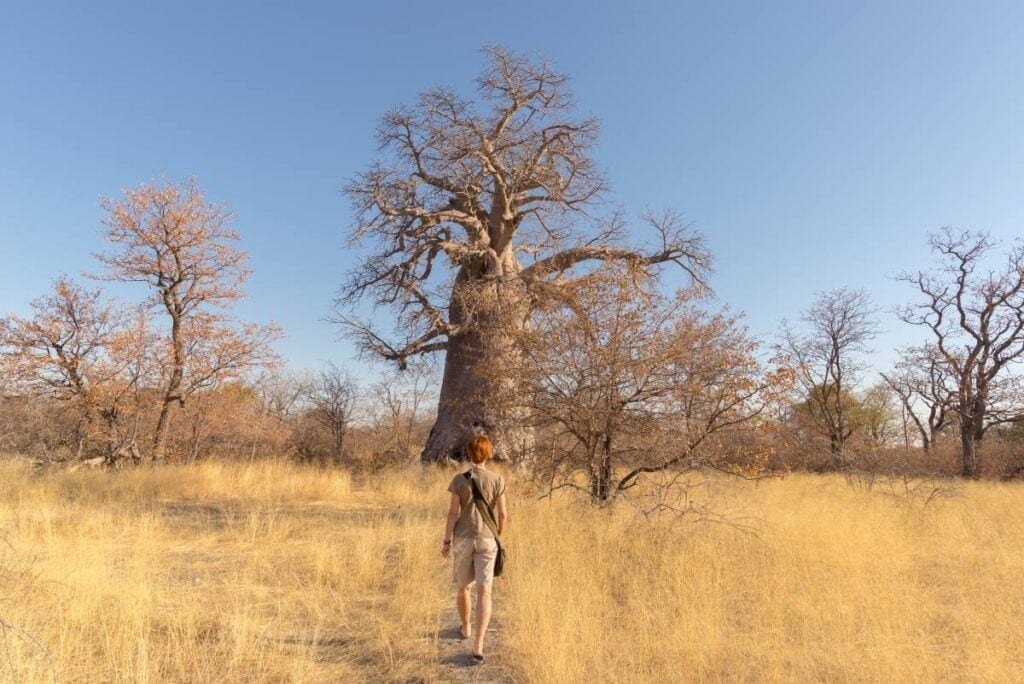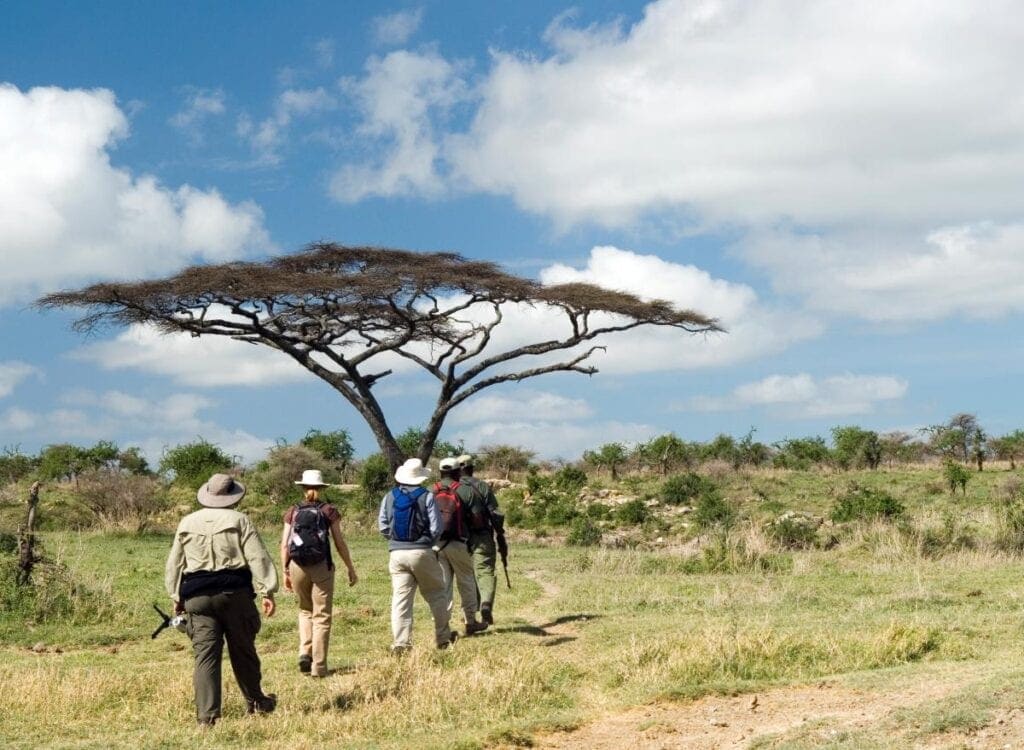The link between nature and mental health is not a new thing, though it is being recognised more and more these days. The renowned architect, Frank Lloyd Wright (who died at 91 in 1959!), famously said: “Study Nature, love Nature, stay close to Nature. It will never fail you.”
This seems to echo the thought of the great Romantic poet, William Wordsworth (1770 – 1850) in Tintern Abbey perfectly: “Nature never did betray the heart that loved her.”
The UK Mental Health Foundation puts it unequivocally: “Our relationship with nature – how much we notice, think about and appreciate our natural surroundings – is critical in supporting good mental health and preventing distress.” And what could be better for an in-depth, rewarding exposure to nature and its healing power than a walking safari in Africa?

How Can a Walking Safari Make You Feel Better?
Zambia’s South Luangwa National Park is generally accepted as the birthplace of the walking safari, pioneered in the 1960s by Norman Carr. Walking safaris offer an immersive and unique blend of adventure, exercise and rejuvenation in the wilderness.
Apart from the extraordinary excitement of encountering wildlife on foot under the guidance of a highly experienced and skilled guide, walking safaris provide significant health benefits. Let’s take a more detailed look at the many restorative, revitalising, and healing benefits of walking safaris.
1. Mindfulness and Presence
A walking safari encourages mindfulness and being fully present in the moment, both essential components of mental health and wellbeing. As you walk through the African bush, populated by a huge diversity of wildlife, the necessity to remain alert and aware puts all your senses into overdrive.
This fosters not only a profound connection with the present moment, but pushes worries and concerns out of your mind as you’re fully engaged with your natural environment. As this total immersion in the immediate nature experience helps clear your mind of everyday concerns, a healing sense of peace and focus is generated. As we all know, this is often very hard to achieve in the rush and stresses of our busy daily lives.
2. Stress Reduction, Relaxation and Healthful Exercise
The calming effect of being in nature, combined with the healthy physical activity involved in a walking safari, significantly reduces stress levels. Studies are clear that exposure to nature decreases stress, anxiety levels and feelings of anger. If exercise is combined with this exposure to nature, it’s even more effective.
Access to green spaces has likewise been linked to improved concentration, better attention spans and a lower risk of depression. Studies have shown that spending time outdoors and engaging in physical exercise is effective in lowering the levels of stress hormones like cortisol. All these factors make walking safaris a perfect dual-action activity combining both exercise and relaxation. They offer a natural escape from the pressures of modern life.
3. A Chance to Reset
Finding time to disconnect and reset is more important than ever in our tech- and digitally driven ‘unnatural’ world. The total immersion in nature of a walking safari offers an extremely effective opportunity to unplug from all the distractions, chores, worry and responsibilities of everyday life, and reconnect with oneself.
The combination of physical activity, exposure to natural beauty, and the simplicity of life in the bush contributes to a sense of overall wellness and can be a powerful reset for both mind and body. A walking safari through the remote and serene baobab-dotted landscapes of Botswana offers a mental restorative much more powerful than many an hour on a therapist’s couch!
4. Vitamin D and Sunshine
The health benefits of a walking safari include the natural vitamin D obtained from sunlight that so many of us are short of these days. Spending time in the sunshine, with appropriate sun protection, of course, boosts your vitamin D levels. Vitamin D is vital for the body’s immune system, nerve health, and its ability to absorb calcium for good bone health and the prevention of osteoporosis. Good vitamin D levels also improves mood and fosters a feeling of positivity. A walking safari is therefore an excellent way to enhance your physical health and emotional well-being.

Other Benefits of a Walking Safari
1. Connection With Nature
A walking safari provides an unparalleled opportunity to connect with nature on a deep level. Walking through the wilderness allows you to observe the intricate details of the natural world, from the tiny insects that play a crucial role in the ecosystem, to the majestic beauty of Africa’s iconic wildlife.
For instance, a walking safari in the diverse ecosystems of the Serengeti and the Ngorongoro Crater invariably provides a deep connection with nature. This intimate encounter enhances our understanding and appreciation of the natural world. This fosters a sense of responsibility towards nature, wildlife and habitats, and underlines the urgency of conservation and preservation.
2. A New Perspective
Walking safaris offer a unique perspective on the intricacies of the African landscape and its innumerable inhabitants. Moving at a slower pace and standing at ground level changes the way we see the environment around us. It offers us insights, experiences and views that are impossible to achieve in a vehicle. This new viewpoint can lead to profound personal insights and a deeper appreciation of the complexities of the natural world.
3. Access Areas that Vehicles Can’t Reach
One of the most exciting aspects of a walking safari is the ability to explore areas that are inaccessible by vehicle. This not only means you’ll likely encounter fewer tourists, but also allows you to discover the untouched beauty of secluded areas and the unique wildlife and ecosystems that flourish there. Whether it’s tracking wildlife footprints, navigating through dense foliage or rocky, uneven terrain, or crossing shallow rivers, the sense of adventure in exploring these often remote areas on foot is unparalleled.
4. Meeting Like-Minded People
An often overlooked yet significant benefit of a fitness safari is the opportunity it presents for meeting like-minded individuals. The shared experience of exploring the wilderness on foot can create connections and friendships that last a lifetime.
Engaging with others who share your enthusiasm for adventure, nature, and conservation can greatly enhance your mental well-being, providing you with social support and a sense of belonging. This also stimulates your mind through engaging conversations and shared experiences. The positive impact of such social connections is well-documented, with studies showing that a strong social network can improve mental health, increase feelings of happiness, and even contribute to a longer life.

Incorporating outdoor fitness into your travel plans through a bush walk safari not only assures you of a great adventure, but also offers notable health benefits. From stress reduction and relaxation to a unique connection with nature, the wellness benefits of a walking safari are significant.
Numerous wildlife reserves and national parks offer and host walking safaris. These include the Serengeti, Kibale Forest National Park, South Luangwa, the Maasai Mara, Chobe, Etosha, the Sabi Sands and the Kruger, to mention but a very few. So, why not lace up your hiking boots and set off on a bush walk safari facilitated by Discover Africa that promises fun and fitness in the African wilderness?
DISCLAIMER: DISCOVER AFRICA DOES NOT PROVIDE MEDICAL ADVICE
The information, including but not limited to, text, graphics, images, and other material contained on this website are for informational purposes only. No material on this site is intended to be a substitute for professional medical advice, diagnosis or treatment. Always seek the advice of your physician or other qualified healthcare provider with any questions you may have regarding a medical condition or treatment and before undertaking a new health care regimen, and never disregard professional medical advice or delay in seeking it because of something you have read on this website.
Author: Vihann Van Wyk
Published:
Last Update: